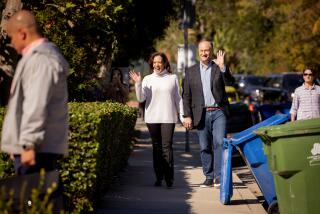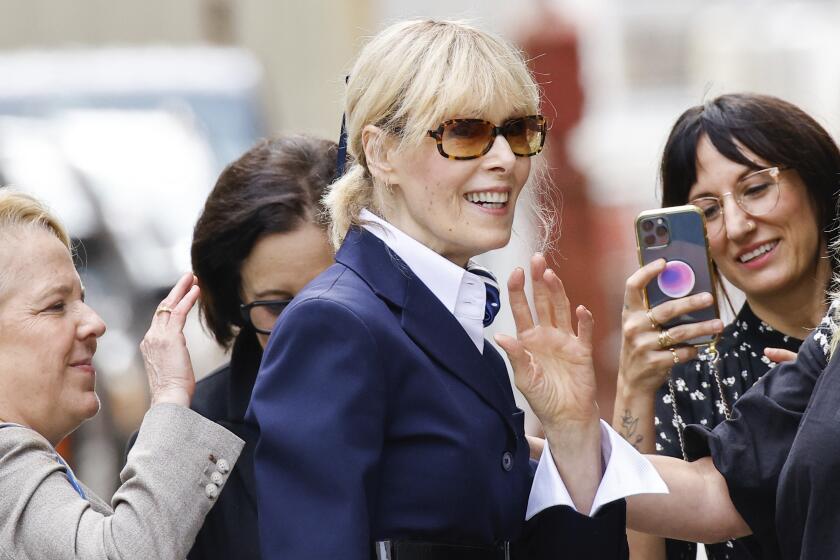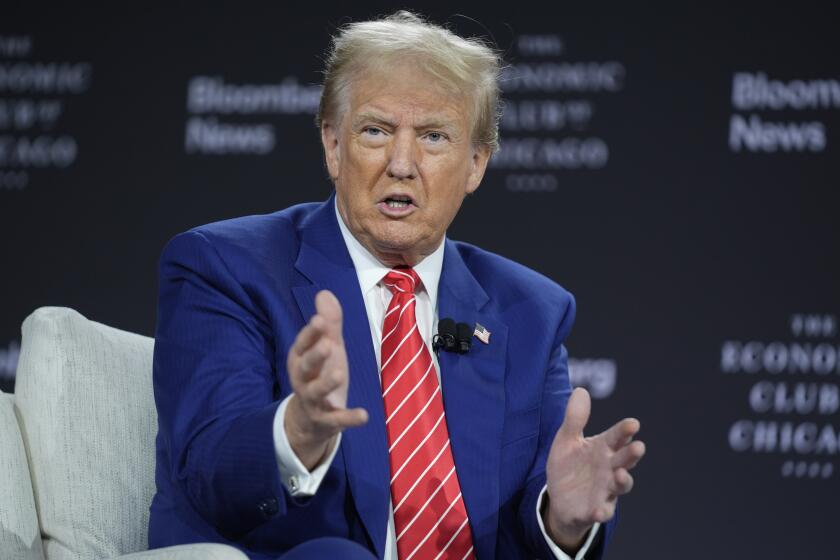Talking Radio
Rush Limbaugh, Howard Stern and Laura Schlessinger won’t be attending. But Michael Jackson, Gloria Allred, Larry Elder, Art Bell, Michael Reagan, advice dispenser Joy Browne and pollster Dick Morris will be among 500 or so participants at the ninth annual convention of the National Assn. of Radio Talk Show Hosts in Century City.
Also there will be John N. Doggett III. Remember the articulate, seemingly self-satisfied Texas business consultant who, during Senate hearings in 1991 on the nomination of Clarence Thomas to the Supreme Court, testified that Anita Hill had “fantasized” about him? Well, Doggett’s now a radio host on KVET-AM in Austin.
This is the second time the radio hosts are meeting in Los Angeles, the nation’s second-largest radio market. The three-day event begins today, with hosts, consultants, station executives and others attending exhibits and panels on topics such as the role of women and minorities in talk radio. Morris, the former advisor to President Clinton, will deliver a keynote address Friday--billed as “never-before-told background information about the Clinton administration’s relationship with talk radio”--and will release a new poll analyzing the talk radio audience--its interests, concerns, problems and tastes.
With about 1,200 talk stations in the nation, this year’s event “will be even with some of our biggest conventions,” says convention Chairman Michael Harrison, editor of Talkers Magazine, a monthly publication. In 1989, the first year of the radio hosts’ convention, there were only 350 such stations.
Talk radio has hit a plateau. “It’s not increasing as much as it did in the early-to-mid 1990s, when there was a boom,” Harrison says. “There aren’t that many AM stations left to go talk. In other words, it’s out there as one of the big formats but it’s gone through its expansion and now it’s holding very well.”
Blanquita Cullum--president of the radio hosts group and host of “BQ View,” an issues-oriented syndicated daytime show that broadcasts out of Washington--says that talk radio has grown “because people really believe it is an alternative form of communication. They love the intimacy that radio and talk radio provides.”
Indeed, according to the most recent rankings by the Arbitron ratings service, talk radio is the nation’s most popular format. During the winter quarter of 1997, among listeners 12 and over, talk radio commanded a 14.2% share of the audience, followed by urban stations with a 10.1% share and country music stations with 9.3%.
*
Of course, tuned-in talk hosts really don’t need a poll to tell them the broader outlines of what listeners are interested in. As both Cullum and Harrison know, partisan politics is taking a back seat to breaking news stories, and to social issues, whether it’s Timothy McVeigh, Kelly Flinn, Jon Benet Ramsey or the teenage girl who delivered her own baby during her senior prom and now is under investigation for the infant’s death.
“Politics was the issue that really made talk radio successful, and people [were] overwhelmed with it,” Cullum notes. “Right now, people are a little bit apathetic about politics, they are a little bit road-weary, but that goes in cycles. . . . I think people need a bit of a breather.”
This, from a fortysomething woman--conservative and Latina--whose bread-and-butter is politics. Cullum explains that her show and its listeners are probably the exception to the current rule.
“Remember, I’m here in the belly of the [political] beast [in Washington], and people that listen to my show look at politics like a spectator sport. They want to hear hardball politics.”
Still, when she did a show not too long ago about pit bulls, saying that owners ought to be required to “post a warning label like you would if you had a pedophile living next door, people went berserk on that and called for two days.”
Harrison, who hosts a syndicated weekend countdown show on the top topics of talk radio, says that the content of talk changes with current events and the mood of the public. “Talk radio is an up-to-the-second reflection of what’s happening, and that’s what it has to be in order to be vital. It’s one of the best bellwethers of American public opinion.”
He sees, much as the Wall Street Journal did in a recent front-page article, a sense of disconnect between people and politicians. “People are not angry; they’re cynical and frustrated. Talk radio listeners were never as angry as the depiction in the mainstream press. They were just vocal. Sometimes the vocalness starts to get hollow if you don’t feel that it’s going to lead to action.”
From her particular vantage point, Cullum seems to echo that. “You’re seeing Republicans look like Democrats,” she says. She decries the fact that both GOP Senate Majority Leader Trent Lott and Clinton have employed Morris, “who puts his finger to the wind” advising them.
So why is the talk radio convention featuring Morris?
“Because he’s good,” she replies easily. “Talk radio is about entertainment, controversy and color.”
Tom vs. John and Ken: And talk radio is about competition. In 1992, KFI-AM (640) dismissed afternoon host Tom Leykis to make room, a few months later, for John Kobylt and Ken Chiampou. Leykis--no longer heard in Los Angeles but syndicated to 120 other markets by Westwood One, with whom he has a new four-year contract--recently suffered another indignity. On May 28, KSTE-AM in Sacramento bumped Leykis from the key 3-7 p.m. slot and replaced him with the syndicated version of KFI’s “John and Ken Show.” Now Leykis follows them there, from 7 to 11 p.m. The station, noted Leykis, simply “shuffled the deck. They moved everything; they moved everybody.”
More to Read
Get the L.A. Times Politics newsletter
Deeply reported insights into legislation, politics and policy from Sacramento, Washington and beyond. In your inbox three times per week.
You may occasionally receive promotional content from the Los Angeles Times.










